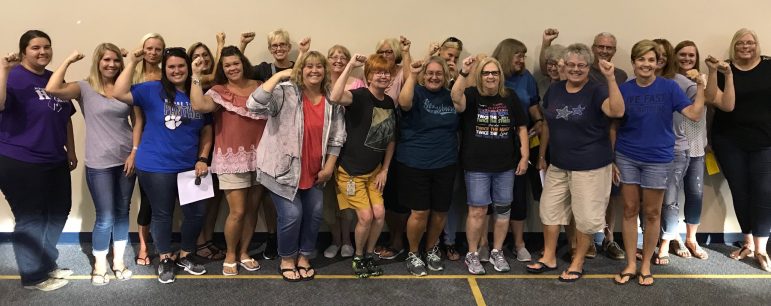OEA VP Scott DiMauro: Graduation Requirements & State Takeover
(MARCH 12, 2019 • COLUMBUS, OH) President Kohler, Vice President McGuire, Superintendent DeMaria, and members of the Board, my name is Scott DiMauro.
I am a high school social studies teacher from the Worthington Schools currently serving as Vice President of the Ohio Education Association.
On behalf of OEA’s 122,000 members, I appreciate the opportunity to provide comments on the Resolution on today’s agenda to supplement and clarify the high school graduation requirements recommendations addressing Section 5 of House Bill 491.
We appreciate the good work of State Superintendent Paolo DeMaria and the State Board of Education in your efforts to come up with recommendations for a new, permanent set of graduation requirements that, in accordance with Substitute House Bill 491, “reduces reliance on state testing, encourages local innovation, and supports student readiness for a career, college and life.”
In particular, OEA supports the superintendent’s recommendations to support students with deliberate planning and career advising, to provide early intervention for middle school and high school students not on track to meet graduation requirements, and to provide training for teachers and others who will evaluate non-standardized demonstrations of student learning.
We urge the Board to go further in looking at ways in which to instill creativity, imagination and a desire to learn in the high school experience by rolling back the excessive burden of standardized testing.
Ohio is in the minority of states that exceeds minimum federal testing requirements for high school students. The number of end-of-course exams, as well as the stakes attached to them, must be reduced.
For example, the testing burden could be further reduced, and teachers given more time to teach, by re-examining the ACT/SAT testing requirements, and reconsidering what is needed for career-technical and other students who are pursuing alternative pathways to graduation.
It is also important that educators have access to reliable test item analysis information that will help them better prepare their students for success.
In any deliberations related to testing and graduation requirements, we urge policymakers to show that they value the professionalism and good judgment of Ohio’s educators who have dedicated their careers to the success of all our students, including incarcerated youth, students with disabilities, English learners, students with interruptions in their formal education, students in poverty, and students of color.
And last, but not least, OEA urges the Board to stick with its original recommendation to have new graduation requirements take effect with the class of 2022.
It is simply unfair and unreasonable to expect that students who are already half way through their high school careers should be expected to meet a whole new set of requirements for graduation.
They, and the education professionals who support them, need time to plan for these changes. The original Superintendent’s Advisory Committee, which consisted of representatives of the K-12, higher education, and business communities, was right to recommend that any new requirements take effect with an incoming freshman class.
We encourage the Board to stand by the recommendation passed in November 2018 and reject an acceleration of the implementation timeline as presented in the draft resolution before you today.
Thank you for your time and attention.

Scott DiMauro
February 2019 Ohio Schools Magazine
- Cover Story: Driving Literacy, Princeton A.C.E. Find Success With Mobile Book Center
- Feature Story: OEA members on using power to create change at 2019 Advocacy and Organizing Institute
- Political Action: The power and potential of our stories to stop the testing insanity
- Legislative Update: OEA Priorities for the 133rd General Assembly
Moved recently? Contact the OEA Member Hotline to update the address on file at 1-844-OEA-Info (1-844-632-4636) or email, membership@ohea.org. Representatives are available Monday-Friday, from 8:30 a.m. to 6 p.m. | OhioSchools — Past Issues
![]()
![]() Oh Yes, We’re Social — Join the Conversation!
Oh Yes, We’re Social — Join the Conversation!
![]()
Silent Tears
#OvertestedOH #RedForEd
OEA Guest Blog | By Tina Allen, ColumbusEA/OEA
 I am a fourth-grade teacher in Columbus City Schools.
I am a fourth-grade teacher in Columbus City Schools.
One of the most devastating and heartbreaking days of my teaching occurred when one day, unexpectedly, one of my students silently put her head down on her desk. Upset with her score on a state-mandated middle-of-the-year test, she began to cry.
She had begun the new school year on the heels of attending summer school because she was unsuccessful in passing the high-stakes Third-Grade Reading Guarantee the year before.
Traumatized By Testing
She had been traumatized by testing. I had seen that expression before. I’ve discussed it with other educators as well as have seen it in other students equally traumatized by the testing process.
As the tears ran down her face, I was speechless and felt disgusted inside.
“I joined this profession to change lives, to educate, motivate and inspire. High-stakes testing almost took that away from me”
Had Testing Traumatized Me Too?
“What had I done?” I asked of myself.
Recognizing she had at least two more standardized tests on the horizon as well as I-Ready assessments, reading assessments, and progress monitoring, I then asked myself, “How can I help her through this? “
It made me realize that unknowingly, I, too, had been traumatized. I was becoming to concerned about “what they needed to know to pass the test” versus “what are they are learning.” Yes, I am advocating for a reduction in high-stakes testing and the creation of alternative pathways for promoting students onward to the next grade.
I joined this profession to change lives, to educate, motivate and inspire. High-stakes testing almost took that away from me.
The tears of a fourth grader reminded me what’s important.
Tina Allen is a member of the ColumbusEA/OEA and a fourth-grade educator at Columbus Cassady Elementary School
![]()
Click here for more #OverTestedOH & #RedForEd Voices and How to Make a Stand
Moonlighting Educators
By Ty Tatman (Zane Trace EA) OEA Director | This post originally appeared in the in Winter 2019 issue of the Communique, a publication of the Central OEA/NEA.
 Moonlighting is often defined as “any type of work that is done in addition to your primary job and after traditional work hours.” For years, a great number of educators worked second and third jobs as a financial necessity.
Moonlighting is often defined as “any type of work that is done in addition to your primary job and after traditional work hours.” For years, a great number of educators worked second and third jobs as a financial necessity.
Collective bargaining and strong union contracts helped make teaching a sustainable career, and moonlighting among educators became less prevalent throughout the latter part of the 20th century.
More recently, financial situations have changed and unconstitutional school funding systems have presented a burgeoning dilemma. More and more teachers have to work outside of the classroom just to get by.
Collective bargaining and strong union contracts helped make teaching a sustainable career….
According to Edweek (June 2018) one in five teachers works a second job. This statistic is somewhat up to interpretation as they counted a supplemental contract as a “second job.” That is up for debate. Is coaching, advising, or tutoring under contract to the same school where you teach truly a second job? If that’s the case, yours truly is working about ten jobs but I digress.
The average educator’s salary is below the living wage in more than half of America.
A Vox Magazine report says that up to 18% of educators work part time jobs outside of the school system. That is a staggering number when the Bureau of Labor Statistics reports that less than 5% of the full-time work force in all other occupations works any kind of second job.
Whether it’s waiting at a restaurant to make ends meet, as a sales clerk at a department store, teaching driver’s education classes on Saturdays or coaching the indoor track team – too many teachers have to work second jobs to get by.
The bottom line?
The average educator’s salary is below the living wage in more than half of America.
As the burdens of the education profession grow larger and larger, it’s not fair to see educators having to work even more outside the classroom!
![]()
 Oh Yes, We’re Social — Join the Conversation!
Oh Yes, We’re Social — Join the Conversation!
![]()
The School Report Card Sham
By Kevin Griffin of the @DublinEA/OEA
The state report cards have been around for several years. Their erroneous grades and convoluted metrics have been so well documented, that educationally, they are about as relevant as Kardashian reruns. It’s unfortunate that districts now need to deal with the annual damage control when they are released.
The real victims are our students.

It’s important for us to remember why these report cards were conceived. It was, quite simply, to make us look bad. The corporate reformers, with help from ALEC, created standardized testing, value-added, and then the report cards, as a way to convince the public their schools were failing. The public didn’t buy it.
But don’t count on the vultures to fly away when there’s money to be made. Despite the fact the legislature knows the report cards are full of problems and half-truths, they are still being used to shut districts down, a thought inconceivable not too long ago.
“But don’t count on the vultures to fly away when there’s money to be made.”
HB 70 uses the report card data to dismantle the school board and replace administrators with a CEO who can basically do whatever he wants. Youngstown and Lorain Schools have already been taken over, East Cleveland is in the process, and Dayton Schools is next in line. The slow, but steady process to turn every school in these areas into a charter school has begun.
The real victims are our students. The one thing the report card does show is an undeniable link between test scores and poverty. In fact, Ohio’s lowest performing districts, those with a performance score under 70, have eight times the number of low-income students as districts with a performance score of 100.
So now these students, the ones who need more support, stability, and love than all the others, will be transported to for-profit charter schools. And we all know how well that works out.
Kevin Griffin is a member of the @DublinEA and the Central OEA Vice President
This post originally appeared in the in Winter 2019 issue of the Communique, a publication of the Central OEA/NEA
![]()
Click here for more #OverTestedOH & #RedForEd Voices and How to Make a Stand
Blog: The Antidote to Despair
By Julie Rine is an English Instructor and an Academic Challenge Advisor at Minerva High School, Minerva, Ohio.
 It’s easy to feel hopeless and overwhelmed right now, isn’t it? The Supreme Court’s decision regarding the Janus case, while not unexpected, still stung. The move by the Court has the potential to weaken unions, many sources say, and the decision has even been referred to as a “crippling blow” .
It’s easy to feel hopeless and overwhelmed right now, isn’t it? The Supreme Court’s decision regarding the Janus case, while not unexpected, still stung. The move by the Court has the potential to weaken unions, many sources say, and the decision has even been referred to as a “crippling blow” .
There are certain unfortunate situations in life that we can’t control, and it’s important to recognize those and let them go rather than devote energy to a state of affairs that cannot be changed.
There are also situations in life that we CAN impact, with our actions, our words, our advocacy, but even in those situations, there are moments when you have to let go, politically, personally, emotionally. You have to take a break, look away, check out, turn off the news and turn on a Friends rerun, lose yourself in a good book, take a few deep breaths and decide to let go and let someone else take up the cause for awhile. Those “let go” moments are critical to maintaining good mental health and restoring energy to jump back into the fray when we are refreshed and ready to go.
But this is not one of those times. This is not a “let go” moment. This is a “Let’s Go” moment.
The media would have you believe that the Janus ruling will lead to fewer union members which means a reduction in funds which equals unions cutting jobs and services and benefits. If you believe the news, soon our teacher unions will be so weak and ineffective that teachers will not be able to influence an impressionable kindergartner, let alone legislative policies.
Don’t believe the hype.
If anyone is equipped to turn a bad roll of the dice into an opportunity to change the game, it’s teachers.
On a daily and weekly basis, we think on our feet, we adapt to a snag in the routine. We reflect on what worked and what didn’t and make adjustments in the three minutes between classes, a task that would take Congress three months. We take on whatever challenges exist in our communities and in our classrooms and we overcome them. We don’t stop there, either. Most of the time, we not only overcome the challenges we face, challenges which can change from year to year and week to week, (sometimes even minute to minute!), we create new programs, new methods, and new realities that are often more effective for our students than what existed before the obstacle presented itself.
I don’t care what your political leanings are, if you are a teacher, you rival only parents in your fierce desire to protect kids and prepare them to succeed in the future.
The union helps us do just that. Through the union, we can fight for what our kids need to succeed, such as smaller class sizes, adequate and up-to-date academic resources, onsite counselors and mental health professionals, and a safe environment in which to learn. The union also helps us fight for what teachers need to help students succeed, such as adequate planning time, meaningful professional development, continued opportunities for further education and training, sufficient time to work as teams to tackle problems rather than as isolated instructors behind our classroom doors, and yes, a fair salary which allows us to focus fully on our students and our own families instead of squeezing in hours away from both while we work a second job to make ends meet. The trickle-down effect here is obvious; when teachers lack support and resources, kids lose the effective education they deserve.
So what can we do?
The decision will not be reversed, and even worse, it appears that a new Justice will be seated who may have equally damaging views of unions and public education.
First, we must remember that Supreme Court Justices are not the only ones allowed to issue opinions. We can write letters to the editor of our local papers, and we can routinely call or write our elected officials to make our voices heard and our opinions known.
Secondly, we can actively recruit members, especially young teachers, to not only join the union, but to become active in the union. Retaining or gaining members will of course help the union financially, since our dues dollars provide us with the resources and training necessary to be effective advocates for our students. But we don’t just need the dues money. We need active and energetic members, more than ever before. Money talks, but members act.
Thirdly, we can help register new voters. If we want a future in which citizens are active participants in the democratic process (whether they are on “our side” or not), then we must emphasize the importance and value of our right to vote, and then take the practical step to register young voters. It is a simple process. There is no reason why every 18-year-old student who graduates from an American high school should not be registered to vote.
 We can’t force them to register, however, so the goal should be to get them excited to register.
We can’t force them to register, however, so the goal should be to get them excited to register.
By teaching our students how to read a variety of sources on any given topic and then to form their own opinion, we help them become critical thinkers. Critical thinkers are often eager to make their positions known, and the most powerful way to do that is to exercise the right to vote. Few moments of my teaching career have been as special to me as when I registered a student to vote and she literally high-fived me and yelled, “I can vote, I can vote!” This is the enthusiasm we must seek to engender in our classrooms.
Perhaps most importantly, we can get involved in local and OEA efforts to elect pro-public education and pro-union candidates. We can work phone banks, canvass door-to-door, talk to our colleagues and friends about why we support certain candidates. We must follow that up by voting for candidates who support us as public school teachers and as union members, up and down the ballot, in local elections, in primaries, in midterms and in presidential elections. These actions are particularly important in Ohio this year, as we will be voting for a senator and a governor.
Political defeats can be discouraging, but nothing feels worse than knowing you could have done more to ensure victory when instead you chose to sit on the sidelines. We must take our frustration and allow it to motivate us to take action.
Sure, the Supreme Court decision is a setback, a challenge to be overcome. But a “blow” to unions? I don’t think so. In fact, I think they might have just poked the beast. Joan Baez said “Action is the only antidote to despair.” So don’t despair. Don’t make this a “let go” moment. This is a “LET’S GO!” moment and I have no doubt that we will persevere and succeed. The teachers’ unions are strong because teachers are strong, and we are stronger when we stand together, as friends, as colleagues, and as proud union members.
![]()
— Julie Rine is an English Instructor and an Academic Challenge Advisor at Minerva High School, Minerva, Ohio.
Maysville Schools’ Support Professionals Vote to Unionize, Join OEA

(Dec. 18, 2018) | For Immediate Release | Contact: Gabriel Weatherspoon Jr. | 740 624-3905
Confirmed by an official ballot count by the State Employment Relations Board, nearly 100 nonunion education support professionals of the Maysville Local School District voted to become an affiliate of the Ohio Education Association (OEA). The Maysville Local School District is located in Muskingum County, near Zanesville.
These education support professionals, which include school bus drivers, custodians, aides, paraprofessionals, secretaries, as well as food service workers will be collectively known as the Maysville Classified Employees Association (MCEA).
“Our primary reason for organizing is to secure fair working standards across the district,” said MCEA spokesperson Gabriel Weatherspoon.
“Regardless of position or title, we ALL deserve to be heard at work and be treated with dignity.”
Emphasizing the role that everyone has in maintaining a safe and robust learning environment for Maysville students, Weatherspoon added: “Regardless of position or title, we ALL deserve to be heard at work and be treated with dignity.”
Similarly, since 1991, the OEA has represented the professional interest of the school district’s approximately 140 teachers and similar certified staff members as the Maysville Education Association.
Today’s vote was the culmination of a months-long organizing campaign.
The Maysville Classified Education Association will now begin the process of negotiating its initial contract with the Maysville Local School Board
“We are looking forward to sitting down with the district and discussing a fair and equitable contract that benefits not only the Maysville classified staff, but also the students we work with every day,” said MCEA Organizing Chair Tammy Smith
![]()
Pictured Below: The Newly Formed Maysville Classified Education Association
• Front, l-r: Mitzi Farmer; Trisha Winland; & Melissa Spring.
• Back: l-r: Robin Windsor; Barb Handshy; Tammy Smith, Organizing Chair; Gabe Weatherspoon, MCEA spokesperson; & Beth McGee

![]()
December 2018 Ohio Schools Magazine
- COVER STORY: Community Connections: Throughout Ohio, OEA members are making a difference for their students, schools, and communities
- Making the Grade
- OEA Educational Foundation announces grants
- Members focus on valuing collaboration at OEA training
- Ohio welding teacher wins $50,000 prize for teaching excellence
- Doris L. Allen Minority Caucus hosts 44th Annual Dinner
Moved recently? Contact the OEA Member Hotline to update the address on file at 1-844-OEA-Info (1-844-632-4636) or email, membership@ohea.org. Representatives are available Monday-Friday, from 8:30 a.m. to 6 p.m. | OhioSchools — Past Issues
![]()
![]() Oh Yes, We’re Social — Join the Conversation!
Oh Yes, We’re Social — Join the Conversation!
![]()
Union Dues Deduction – no longer available
Members Only
This content is for OEA members only. If you are a member, please click the button below to log in.
If you are a member but haven't registered before, please click here to register.
Legislative Watch

Legislature Votes to Extend Alternative Graduation Pathways
The Ohio House and Senate have approved a bill (HB 491) to extend the alternative graduation pathways to the classes of 2019 and 2020. The bill passed the Senate by a vote of 29-0 and the House concurred by a vote of 78-1. OEA strongly supports the extension of the alternative pathways and applauds this action.
Under current law, in addition to successfully completing required coursework, students are required to meet one of three graduation “pathways” each of which is dependent on the results of high-stakes testing.
Senate Passes Bill to Restore OPERS Credit for DD Employees
On Thursday, December 6, 2018, the Senate unanimously passed House Bill 572 by a vote of 29-0. The bill addresses the issue of service credit for non-teaching employees of County Boards of Developmental Disabilities. OEA strongly supports this bill as this legislation. The bill would require OPERS to grant a full year of service credit to employees who meet certain conditions.
HJR 19 Stalls in House Committee
House Joint Resolution 19 is a proposed Constitutional amendment that would make it more difficult to pass amendments to the Ohio Constitution through the initiative process. The proposal was met with sharp criticism as an attack on direct democracy. It does not appear that the legislature will move this proposal in the lame duck session. However, this is likely to be an ongoing issue next session.
Click here for more details about these three legislative initiatives!


